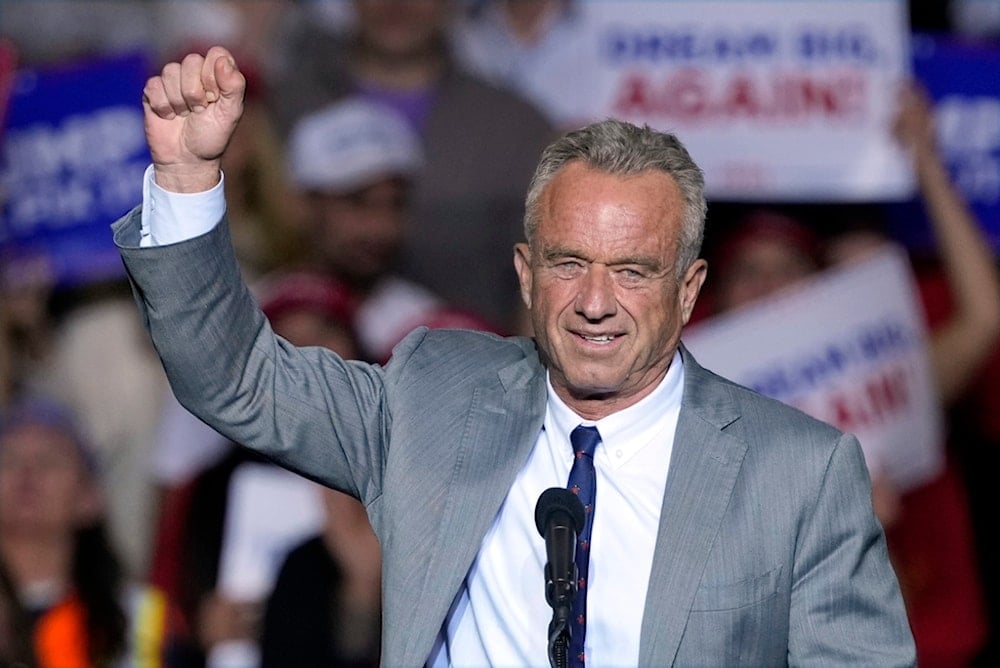Trump appoints RFK Jr. as chief of top US health agency
Robert F. Kennedy Jr. has been selected to head the Department of Health and Human Services despite his record of problematic health opinions.
-

Robert F. Kennedy Jr., speaks before Republican presidential nominee former President Donald Trump at a campaign event Friday, November 1, 2024, in Milwaukee, US. (AP)
US President-elect Donald Trump announced Robert F. Kennedy Jr., who has explicitly shared problematic health opinions, as the secretary of the United States' top health agency, the Department of Health and Human Services.
RFK Jr. was previously running for the elections as an independent before dropping out and endorsing Trump, often signaling hopes for scoring a seat in his government. Later in August, Kennedy was appointed to Trump's transitional government to ease and shape the administration's policies and personnel.
In a post on X, RFK Jr. expressed his gratitude and ambitiously pledged to "end the chronic disease epidemic" and "Make America Healthy Again". According to Reuters, RFK Jr. allegedly considers obesity, autism, and diabetes as chronic diseases he wishes to tackle.
Kennedy also vowed to mitigate health corruption, return the health industry and facilities to higher standards of care, and expose Americans to the data they need to make the correct health decisions.
Thank you @realDonaldTrump for your leadership and courage. I'm committed to advancing your vision to Make America Healthy Again.
— Robert F. Kennedy Jr (@RobertKennedyJr) November 14, 2024
We have a generational opportunity to bring together the greatest minds in science, medicine, industry, and government to put an end to the chronic…
'A renegade appointment'
The Department of Health and Human Services (HHS) manages drug regulation, public health agencies such as the Centers for Disease Control and Prevention, and provides health insurance to over 140 million individuals, including low-income individuals, seniors aged 65 and older, and people with disabilities through Medicare and Medicaid.
Drew Altman, president of health research firm KFF, highlighted in light of the appointment that Kennedy does not have any tangible experience that makes him suitable for the role, including with programs such as Medicare and Medicaid, describing it as "a renegade appointment."
"Historically, secretaries have been people with real experience and standing in national healthcare and he certainly is not that, and has views from outside the mainstream, and is a renegade appointment," he said.
Public health advocates have also been sharing their concerns ahead of his appointment, anticipating a negative outcome to his policies on Americans' health given his power over public agencies. The Democratic Party also condemned the selection.
The Kennedy Health Doctrine
Kennedy has proposed significantly reducing the 18,000-strong workforce at the Food and Drug Administration, which is responsible for overseeing the safety of food, drugs, and medical devices, and replacing numerous staff members at the National Institutes of Health.
"If you work for the FDA and are part of this corrupt system, I have two messages for you: 1. Preserve your records, and 2. Pack your bags," he wrote on X in late October.
In early November, Robert F. Kennedy Jr. suggested removing fluoride from public water supplies, linking it to bone fractures and cancer.
In a September opinion article for the New York Times, he criticized the weight loss drug Ozempic, arguing that it addressed and managed symptoms rather than the root causes of obesity, while benefiting Big Pharma executives.
Dr. Ashish Jha, former White House COVID-19 Response Coordinator, emphasized that Kennedy's position is not just about fluoride or vaccines but about the broader influence of the Secretary of Health and Human Services, who controls Medicare and drug access. James Capretta, a senior fellow at the American Enterprise Institute, noted that while Kennedy's impact on policy is uncertain, there are significant constraints on policy-making even at the top levels of government.
Kennedy's view on vaccines
Shares of vaccine manufacturers, including Pfizer and Moderna, dropped following news of Robert F. Kennedy Jr.'s appointment, falling by as much as 2% in after-hours trading.
Kennedy has faced criticism for promoting false medical claims, such as linking vaccines to autism, and for opposing both state and federal COVID-19 restrictions, which led to accusations of spreading misinformation about the virus.
While he denies being anti-vaccine, stating that he advocates for more thorough vaccine testing, he led the Children's Health Defense, a nonprofit known for promoting anti-vaccination.
In a March interview, while still a presidential candidate, Kennedy assured that Americans could still access vaccines if he were elected, but he expressed skepticism about the effectiveness of measles vaccines. Measles, a highly contagious virus that is nearly entirely preventable through vaccination, requires a 95% vaccination rate to prevent outbreaks. However, the CDC recently reported that vaccination rates in the US have fallen below this threshold among young children.

 4 Min Read
4 Min Read








